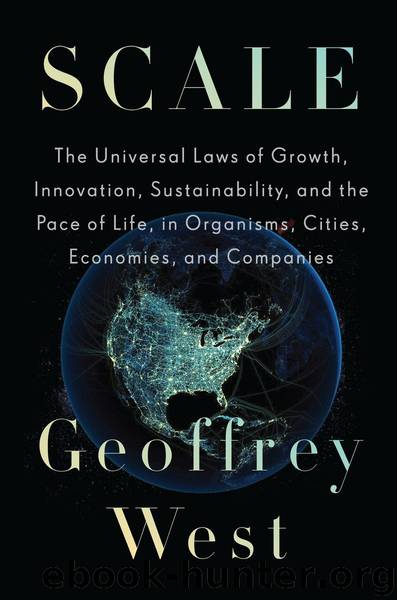Scale by Geoffrey West

Author:Geoffrey West
Language: eng
Format: epub, azw3
Publisher: Penguin Publishing Group
Published: 2017-04-24T08:28:05+00:00
6
PRELUDE TO A SCIENCE OF CITIES
1. ARE CITIES AND COMPANIES JUST VERY LARGE ORGANISMS?
The success of the network-based theory for understanding scaling laws and providing a big-picture conceptual framework for quantitatively addressing diverse questions across a broad spectrum of biology naturally leads to the question of whether this framework could be extended to understand other networked systems such as cities and companies. Superficially these have much in common with organisms and ecosystems. After all, they metabolize energy and resources, produce waste, process information, grow, adapt and evolve, contract disease, and even develop what could be characterized as tumors and growths. In addition, they age, and in the case of companies, almost all of them eventually die, whereas for cities only extremely few ever do, an enigma we shall come to consider later.
Many of us blithely use phrases like the “metabolism of a city,” the “ecology of the marketplace,” the “DNA of a company,” and so on, as if cities and companies were biological. Even as far back as Aristotle we find him continually referring to the city (the polis) as a “natural” organic autonomous entity. In more recent times an influential movement in architecture has arisen called Metabolism, which was explicitly inspired by analogy with the idea of biological regeneration driven by metabolic processes. This views architecture as an integral component of urban planning and development and as a continually evolving process, implying that buildings should be designed ab initio with change in mind. One of its original proponents was the well-known Japanese architect Kenzo Tange, the 1987 winner of the Pritzker Prize, considered to be the Nobel Prize of architecture. I find his designs, however, to be surprisingly inorganic, dominated by right angles and concrete and somewhat soulless, rather than having the curvaceous, softer qualities of an organism.
Writers, too, have often expressed organic visions of cities. An extreme example is Jack Kerouac, one of the charismatic founders of Beat poetry and literature in the 1950s, who whimsically wrote, “Paris is a woman but London is an independent man puffing his pipe in a pub.” However, it is in business that the concepts and language if not the actual science of ecology and evolutionary biology have seized the imagination, especially in Silicon Valley. The concept of a business ecosystem has become a standard buzzword to connote a sort of Darwinian survival of the fittest in the marketplace. It was introduced in 1993 by James Moore, then at Harvard Law School, in an article he wrote titled “Predators and Prey: A New Ecology of Competition,” which won the McKinsey award for article of the year.1 It’s a fairly standard ecological narrative, with individual businesses replacing animals in the evolutionary dynamics of natural selection. In keeping with much of the traditional literature on understanding companies, it’s entirely qualitative with no quantitative predictive power. Its great virtue is that it emphasizes the role of community structure, the importance of systemic thinking, and the inevitable processes of innovation, adaptation, and evolution.
Download
This site does not store any files on its server. We only index and link to content provided by other sites. Please contact the content providers to delete copyright contents if any and email us, we'll remove relevant links or contents immediately.
| Anthropology | Archaeology |
| Philosophy | Politics & Government |
| Social Sciences | Sociology |
| Women's Studies |
Nudge - Improving Decisions about Health, Wealth, and Happiness by Thaler Sunstein(7706)
The Fire Next Time by James Baldwin(5444)
iGen by Jean M. Twenge(5415)
Adulting by Kelly Williams Brown(4574)
The Sports Rules Book by Human Kinetics(4386)
The Hacking of the American Mind by Robert H. Lustig(4383)
The Ethical Slut by Janet W. Hardy(4251)
Captivate by Vanessa Van Edwards(3839)
Mummy Knew by Lisa James(3691)
In a Sunburned Country by Bill Bryson(3542)
The Worm at the Core by Sheldon Solomon(3487)
Ants Among Elephants by Sujatha Gidla(3467)
The 48 laws of power by Robert Greene & Joost Elffers(3291)
Suicide: A Study in Sociology by Emile Durkheim(3022)
The Slow Fix: Solve Problems, Work Smarter, and Live Better In a World Addicted to Speed by Carl Honore(3009)
The Tipping Point by Malcolm Gladwell(2921)
Humans of New York by Brandon Stanton(2873)
Get What's Yours for Medicare: Maximize Your Coverage, Minimize Your Costs by Philip Moeller(2730)
Handbook of Forensic Sociology and Psychology by Stephen J. Morewitz & Mark L. Goldstein(2705)
